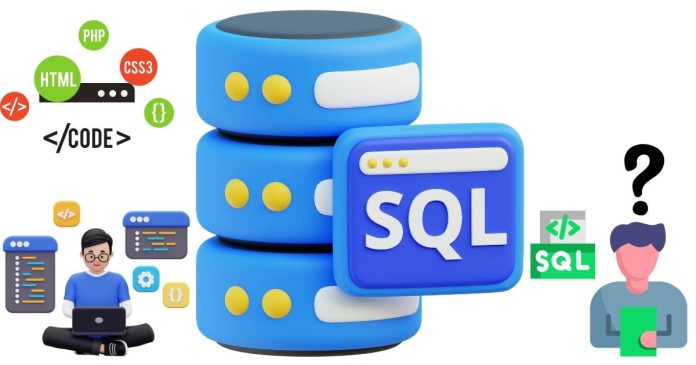SQL (Structured Query Language) is a fundamental skill for many data-related roles, including database administrators, data analysts, and backend developers. As we enter 2025, SQL remains a key area of focus in technical interviews. Here are some of the most common SQL interview questions you might encounter, categorized by skill level.
Basic SQL Interview Questions
These questions test your foundational knowledge of SQL.
- What is SQL, and why is it important?
Explain SQL as a language used to manage and manipulate relational databases, and discuss its importance in handling structured data. - What are the different types of SQL statements?
SQL statements are typically divided into:- DDL (Data Definition Language):
CREATE,ALTER,DROP - DML (Data Manipulation Language):
SELECT,INSERT,UPDATE,DELETE - DCL (Data Control Language):
GRANT,REVOKE - TCL (Transaction Control Language):
COMMIT,ROLLBACK
- DDL (Data Definition Language):
- How do you write a SELECT statement?
SELECT column1, column2 FROM table_name WHERE condition; - What is a primary key?
A primary key uniquely identifies each record in a table and ensures data integrity. - What is the difference between
WHEREandHAVINGclauses?WHEREfilters rows before grouping.HAVINGfilters groups after aggregation.
Intermediate SQL Interview Questions
These questions delve into more advanced concepts and practical problem-solving.
- How do you use JOINs? Explain their types.
JOINs combine data from multiple tables:- INNER JOIN: Returns matching rows.
- LEFT JOIN: Returns all rows from the left table and matching rows from the right table.
- RIGHT JOIN: Returns all rows from the right table and matching rows from the left table.
- FULL OUTER JOIN: Returns rows when there is a match in either table.
Example:
SELECT employees.name, departments.department_name FROM employees INNER JOIN departments ON employees.department_id = departments.id; - What is the difference between UNION and UNION ALL?
UNIONremoves duplicate rows.UNION ALLincludes duplicates.
- What is a subquery? Provide an example.
A subquery is a query nested within another query.Example:
SELECT name FROM employees WHERE salary > (SELECT AVG(salary) FROM employees); - How do you find duplicate records in a table?
SELECT column1, COUNT(*) FROM table_name GROUP BY column1 HAVING COUNT(*) > 1; - What is the purpose of an index in SQL?
An index improves the speed of data retrieval operations but may slow down data modification operations due to additional overhead.
Advanced SQL Interview Questions
These questions test deep knowledge and problem-solving ability.
- What is a CTE (Common Table Expression)? How is it different from a subquery?
A CTE is a temporary result set defined using theWITHclause that can be reused within the query.Example:
WITH CTE_Example AS ( SELECT department_id, AVG(salary) AS avg_salary FROM employees GROUP BY department_id ) SELECT * FROM CTE_Example WHERE avg_salary > 50000;Unlike subqueries, CTEs are more readable and reusable.
- How would you optimize a slow-running query?
- Use indexes strategically.
- Avoid
SELECT *; specify only required columns. - Optimize JOINs by indexing foreign keys.
- Use query execution plans to identify bottlenecks.
- Break down complex queries into smaller steps or use temporary tables.
- What is the difference between OLTP and OLAP databases?
- OLTP (Online Transaction Processing): Optimized for managing transactional data, focusing on quick, insert, update, and delete operations.
- OLAP (Online Analytical Processing): Designed for complex queries and data analysis, often used in data warehouses.
- What are window functions in SQL?
Window functions perform calculations across a set of table rows related to the current row without collapsing rows.Example:
SELECT name, salary, RANK() OVER (PARTITION BY department_id ORDER BY salary DESC) AS rank FROM employees; - What is database normalization? Explain its levels.
Database normalization organizes data to minimize redundancy and improve integrity. Levels include:- 1NF: No repeating groups.
- 2NF: 1NF + no partial dependency.
- 3NF: 2NF + no transitive dependency.
Behavioral SQL Questions
Interviewers may also ask about real-world scenarios to evaluate your problem-solving skills.
- How do you approach debugging a failing query?
- Check for syntax errors.
- Validate table and column names.
- Test individual query parts.
- Analyze query execution plans.
- Can you describe a challenging SQL problem you solved?
Share specific examples from past experiences, highlighting how you identified and resolved the issue. - How do you ensure data accuracy in a large database?
- Use constraints like primary keys, foreign keys, and unique keys.
- Perform data validation during inserts and updates.
- Implement data auditing processes.
Tips for SQL Interviews
- Practice writing queries: Use sample databases like Chinook, AdventureWorks, or any open-source datasets.
- Understand database design principles: Know how to design normalized and optimized databases.
- Familiarize yourself with tools: Be comfortable using SQL clients like MySQL Workbench, SQL Server Management Studio, or pgAdmin.
- Prepare for real-world problems: Employers value practical problem-solving over theoretical knowledge.
By preparing for these common SQL interview questions in 2025, you’ll be ready to tackle any database-related challenge with confidence!


